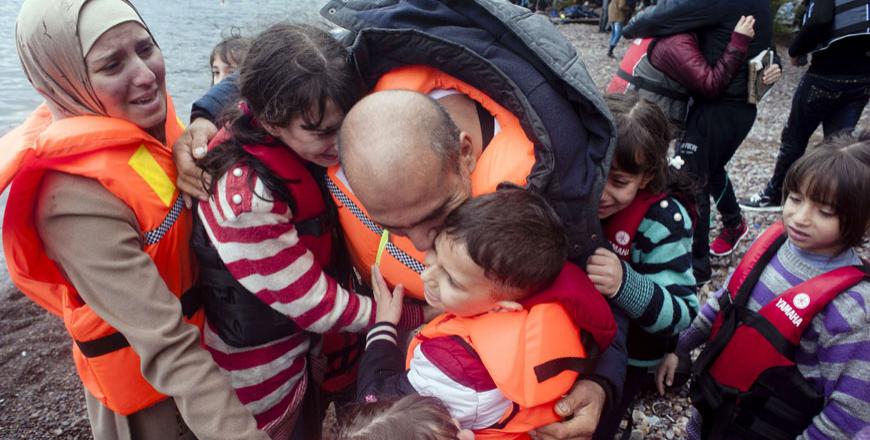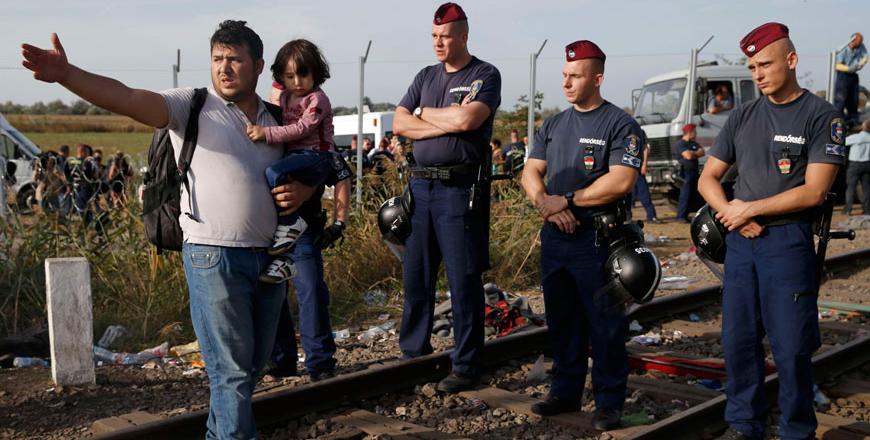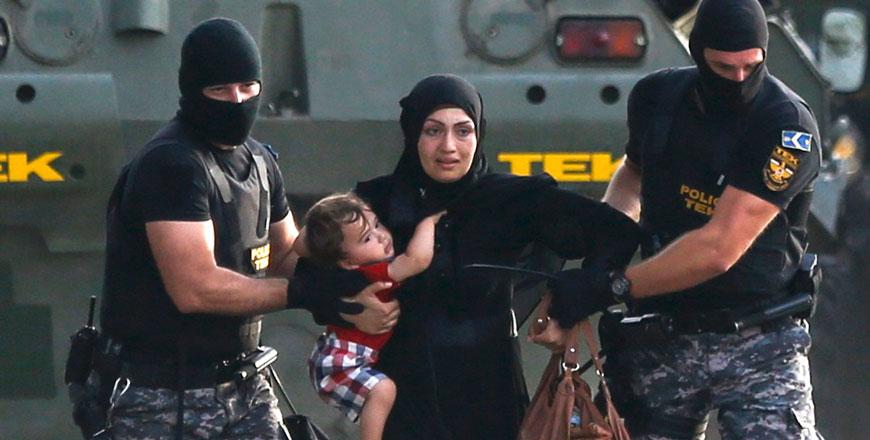You are here
EU urged to secure borders from ‘millions’ of migrants
By AFP - Sep 23,2015 - Last updated at Sep 23,2015

Migrants and refugees arrive on Kagia beach near the village of Sykamia, west of the port of Mytilene, on the Greek island of Lesbos after crossing the Aegean Sea from Turkey on Wednesday (AFP photo)
BRUSSELS — The EU's president urged leaders gathering for an emergency summit Wednesday to stop fighting over a refugee quota deal and take urgent action to secure the bloc's borders in the face of "millions" of migrants.
After ministers forced through a deal to relocate 120,000 refugees in the teeth of opposition from eastern states, Hungary's hardline prime minister angrily denounced Germany's "moral imperialism".
Slovakia furiously vowed to dispute the quota deal in court, underscoring the deep divisions that have emerged over Europe's biggest migration crisis since World War II.
Donald Tusk, head of the European Council, called for an end to "the cycle of mutual recriminations and misunderstandings" fuelling the split between the EU's richer west and poorer former communist east.
"The most urgent question we should ask ourselves tonight is how to regain control of our external borders," Tusk, a former Polish prime minister, told reporters.
"The conflicts in the Middle East, especially in Syria and Iraq, will not end anytime soon," he said. "This means today we're talking about millions of potential refugees trying to reach Europe, not thousands."
Draft summit conclusions seen by AFP call for EU states to give 1 billion euros ($1.1 billion) to the World Food Programme and UN refugee agency to help refugees in Syria.
They further called for more aid to affected countries outside the bloc including the western Balkans and Syria's neighbours Turkey, Jordan and Lebanon.
The EU leaders also said extra staff and equipment should be sent to shore up border controls and the EU's border agency Frontex.
Eastern anger
The 120,000 refugee relocations are just a faction of the 500,000 migrants who have come to Europe's shores so far this year and the estimated 4 million camped on Syria's borders.
The scale of the challenge was evident in Croatia, where nearly 9,000 migrants entered on Tuesday alone, a record daily number since they started to arrive a week ago after Hungary built a fence on its border with Serbia.
Over the last week, more than 44,000 refugees have entered Croatia from non-EU Serbia.
Yet unity has eluded the EU so far. In a rare move on the eve of the summit, EU interior ministers did not wait for unanimous agreement but passed the relocation plan by majority vote despite strong resistance from Hungary, the Czech Republic, Romania and Slovakia.
The eastern states argued that the EU has no right to override national sovereignty and make them accept people from overwhelmed frontline states such as Greece and Italy.
"The most important thing is that there should be no moral imperialism," Hungary's Premier Viktor Orban said during a visit to the southern German state of Bavaria when asked what he expected from German Chancellor Angela Merkel.
Orban then piled pressure on Greece, a frontline state struggling to deal with thousands of refugees flooding in by sea, mainly from Turkey, even as Athens is still reeling from its debt crisis.
"If the Greeks are not able to defend their own borders, we should ask — kindly because Greece is a sovereign country — to let the other countries of the EU to defend Greece's borders," he told reporters as he arrived for the summit.
'Victory for EU'
Slovakian Prime Minister Robert Fico, whose country will have to take 800 migrants under the relocation plan, said he was prepared to break the EU's rules rather than accept the "diktat" from Brussels.
"Slovakia is not going to respect mandatory quotas. We are filing a lawsuit with the [EU's] Luxembourg court," Fico said, quoted by the website of Slovakia's leading SME daily.
But EU Migration Commissioner Dimitris Avramopoulos rejected any suggestion that the rare failure to reach a unanimous agreement on the relocation plan did more harm than good.
"On the contrary, it is a victory for the EU and for all member states," Avramopoulos said on Wednesday.
However Brussels flexed its muscles by issuing formal warnings to 19 EU states including Germany and France for breaching the bloc's established rules on the treatment of asylum seekers.
US President Barack Obama had on Tuesday pressed European nations to take their "fair share" of refugees, despite accusations that Washington has done little to address the crisis.
With millions of Syrians forced into camps across the Middle East, tens of thousands crossing Europe on foot and hundreds washing up dead on beaches, America has promised to take in at least 10,000 Syrian refugees next year.
That figure is dwarfed by a million asylum seekers that Germany is expecting to welcome by the end of this year.
Related Articles
ROSZKE, Hungary/VIENNA — Two decades of frontier-free travel across Europe unravelled on Monday as countries re-established border controls
SID, Serbia/ROSZKE, Hungary — Riot police fired water cannon and tear gas on Wednesday at migrants demanding to be let through Hungary's new
BRUSSELS — Greece recalled its ambassador from Austria on Thursday and warned it would not be treated as "Europe's Lebanon" as the migrant c














